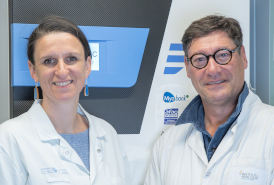 Myobank-AFM, the Institute of Myology’s biological resource centre, is offering patients a new donation card. This service, set up in 1996 to help researchers and advance knowledge of neuromuscular diseases, is increasingly in demand from those involved in both basic and clinical research.
Myobank-AFM, the Institute of Myology’s biological resource centre, is offering patients a new donation card. This service, set up in 1996 to help researchers and advance knowledge of neuromuscular diseases, is increasingly in demand from those involved in both basic and clinical research.
Myobank-AFM‘s mission is to collect, prepare, store and provide fluid and tissue samples from patients suffering from these diseases.
Collecting patients’ tissues
 During surgery, the tissues removed, which are considered to be ‘surgical residues’, are normally incinerated. But if patients or their families have given their consent before the operation, these ‘residues’ are collected, processed and stored by the Myobank-AFM team, Stéphane Vasseur and Maud Chapart-Leclert. Patients can choose to make a donation even if the planned operation is not directly related to their illness. In this way, they enrich the biobank and enable researchers to carry out work on their disease.
During surgery, the tissues removed, which are considered to be ‘surgical residues’, are normally incinerated. But if patients or their families have given their consent before the operation, these ‘residues’ are collected, processed and stored by the Myobank-AFM team, Stéphane Vasseur and Maud Chapart-Leclert. Patients can choose to make a donation even if the planned operation is not directly related to their illness. In this way, they enrich the biobank and enable researchers to carry out work on their disease.
Diversified use of resources, for both fundamental and clinical research
An increasing range of research players are making use of the Myobank-AFM; for example, clinicians at the Centres of Reference for Neuromuscular Diseases can request tissue from patients who have donated tissue to carry out or refine a diagnosis, thereby avoiding the need for additional invasive sampling.
Myoline, the Institute’s platform that creates immortal human cell line models and supplies many research teams, also makes use of this service. ‘Most of the muscle and skin samples we work with come from the Myobank-AFM’ explains Anne Bigot, head of Myoline.
Teams working on clinical trials and patients undergoing treatment can also make use of it. Piera Smeriglio, head of the Biotherapies for Motor Neurone Diseases (ALS & SMA) team at the Center of Research in Myology, is currently conducting a study to understand why SMA patients treated with nusinersen, risdiplam or both suffer from persistent muscle fatigue. After comparative analysis of muscle tissue collected by the Myobank-AFM, from treated patients and “control” individuals, the researcher has shown that ‘the levels of SMN – the protein that fails in SMA – are similar, but that in the patients, the mitochondria – the cells’ energy factories – show defects, and that this correlates with muscle denervation’.
In order to be able to provide researchers with the widest possible range of tissues from patients and continue research into the various neuromuscular diseases, Myobank-AFM is relying on donations from patients.
More about Myobank-AFM
